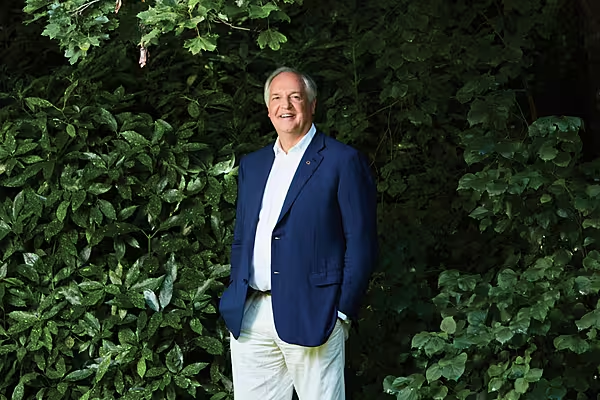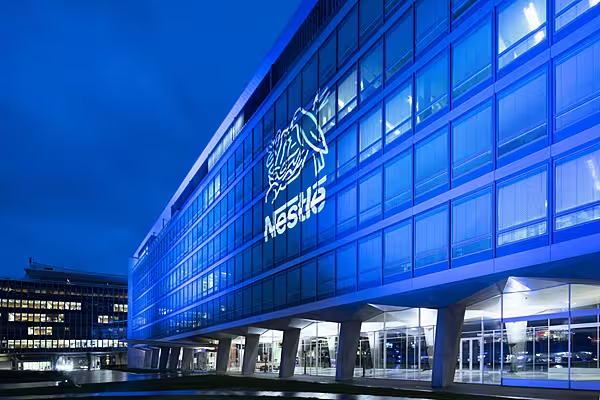Former Unilever CEO Paul Polman is one of the most successful consumer goods leaders of the past decade, and one of the most respected business voices on the planet, particularly when it comes to CSR. Stephen Wynne-Jones met him. This article first appeared in ESM May/June 2022.
In the opening preface to his new book, Net Positive: How Courageous Companies Thrive by Giving More Than They Take (written alongside Andrew Winston), Paul Polman quotes the late Desmond Tutu. When asked whether he was of an optimistic or pessimistic mindset, the late theologian replied, “I am a prisoner of hope.”
With the world around us seemingly going to hell in a hand basket – with pandemics, social upheaval, war, and climate collapse permeating our lives – it can be difficult to be optimistic, but for businesses – not to mention wider society – sometimes the biggest changes occur out of the biggest periods of disruption, and with the right kind of mindset, these changes can be positive, rather than negative.
From a consumer goods perspective, Polman needs no introduction. Having cut his teeth at Nestlé and Procter & Gamble, Polman is perhaps best known for his decade at the helm of Unilever, where he developed the ‘Sustainable Living Plan’ – a modus operandi built around combining environmental and social progress with economic growth.
In a business environment defined by quarterly reporting and quick wins, Polman’s longer-term strategy was a break from the norm and proved hugely successful, with a total shareholder return of 290% delivered during his tenure. Such was his commitment to driving positive change that when he left the company in 2018, rather than the usual celebratory fanfare, Unilever announced plans to hire 8,000 people with disabilities – a more meaningful farewell ‘gift’ than the standard gold watch.
Among Polman’s many current responsibilities, including global commissioner of the New Climate Economy at the World Retail Institute and vice-chair of the United Nations Global Compact, is being the co-chair and co-founder of IMAGINE, an organisation that aims to help leaders use their ‘power for good’ to address climate change and inequality.
Shaping The Future
It’s in this spirit that he co-wrote Net Positive, a book in ‘service of the billions of people worldwide who are still left behind, and who deserve courageous leaders who will stand with them in building a better world,’ as its first page states. A net-positive world is one that tackles the biggest issues facing humanity collaboratively, being proactive and shaping the rules before they shape you – in other words, going beyond what is expected and becoming a force for good, rather than just making up the numbers.
As we put it to Polman when we caught up with him on the sidelines of the World Retail Congress in Rome, while many firms are indeed making progressive steps towards greener, more equal operating structures, the prevalence of short-term thinking in business means that this is often a case of ‘one step forward, one step back.’
“Companies that think over the longer term create more shareholder value,” Polman says, with the confidence of someone who has been there, done that. “This is also better for shareholders than companies that myopically focus on quarters and shareholders alone. It has always been the case.”
As to why it has taken so long for the corporate world to embrace values-based thinking, Polman says that with globalisation driving growth around the world and millions being taken out of poverty, businesses didn’t “ask the questions we should have been asking”.
Now, however, “we need to change, whether we like it or not,” and purpose-driven businesses are the ones best placed to achieve that – or, as the book puts it, ‘it’s time to wake up from our fifty-year, zombielike obsession with profits.’
Why Mayo Beat Ketchup
Arguably the most interesting chapter of Net Positive is the opening one. Titled ‘Why Mayo Beat Ketchup’, it is a play-by-play account of how Unilever offset a $143 billion hostile takeover attempt by Kraft Heinz in 2017. As the book puts it, Kraft Heinz owner 3G Capital, which instigated the takeover, was a ‘perfect example of what shareholder primacy looks like in action’ – an organisation with ‘no feel for long-term value creation’. It’s a period that still rankles with Polman, even five years later.
“I think it points to the fact that you can’t save your way to prosperity,” he says. “You have to have a more responsible business model that actually is also better for shareholders – also by continuing, with discipline, to stick to the normal things that you always need: a great vision for your business, an adjustment of your portfolio, and all the other things.
“One thing I can tell you for sure is with the Wells Fargos or the GEs or the Boeings, etc. – they all became huge victims of the short-termism that had crept into their culture. Embracing a longer-term business model gives you a better chance to be successful.”
A Different Approach To Growth
At Unilever, Polman put this strategy into practice as soon as he was in the door, putting an end to quarterly reporting and full-year guidance, focusing on more aspirational aims, while, at the same time, maintaining traditional business growth targets.
“Companies go through cycles, and sometimes it takes a little bit of time to adjust,” he says. “Some of the market might be dissatisfied with that. Despite moving to a more multi-stakeholder model and being more sustainable, you still need to run your company well.
“I always said at Unilever, ‘We didn’t compromise on performance – we used it as an accelerator for performance.’ Over ten years, with consistent top- and bottom-line growth, we were able to move the company to a system of being more responsible as a business model, but we were always very careful with sequencing and being creative.”
Unfortunately, many of the problems with how businesses are run are endemic, Polman explains, and deeply rooted in their company structures.
“Many leaders have a tenure of less than five years now, at the major companies, and you cannot address these issues in such a short time frame. Also, many leaders are self-centred. They’re more worried about their salaries and how it’s linked to their compensation. Because they have such a shorter period in the role, they’re trying to take care of themselves in many respects.
“We need to redefine what success looks like. If we continue to narrowly define it in terms of GDP or financial return, that’s not going to work. We need to look at the broader environmental and social capital, and try to optimise that.”
The Right Leaders
On this, Net Positive features a somewhat chilling statistic: in 2019, in the 350 largest companies in the US, CEOs made 320 times more than their average worker. This compares to 61 times more in 1989, and 21 times more in 1965 – or, to put it another way, adjusted for inflation, typical CEO compensation has grown by more than 1,100% over the past 40 years, while worker wages have grown by 14%.
“It’s very sad to see now that, in the US, CEO salaries are at a record high when the rest of society has suffered,” Polman explains. “That undermines trust. We need to have the right leaders – there’s no question about it.”
He references a recent piece of research by the Aspen Institute, which interviewed students before they went into business school and after they came out.
“When they went in, they were all purpose driven, lofty – they wanted to change the world. When they came out, they wanted to make money, they wanted to go to Goldman Sachs, they wanted to beat their competition. So, from humans, we created little monsters.
“Our MBA programmes and our business programmes are creating little Milton Friedmans on steroids.”
For businesses that think quarter to quarter, instigating change is made all the more difficult by the constantly shifting topography of modern times. While many had hoped to breathe more easily once the pandemic subsided, the current landscape is anything but ‘normal’, with sky-high inflation, supply chain chaos, and conflict in Europe. With the lack of a firm bedrock on which to build, is fundamental change more difficult to achieve?
“I would argue that it’s an advantage,” says Polman. “First and foremost, we need systems change. We cannot continue to optimise in a system that doesn’t work. For systems change to happen, you need disruption, and if you have a bigger level of disruption, that’s actually better because you get bigger systems change.
“At the moment, people are talking about boycotting Russian fuel because of the human rights abuses in Ukraine. That is something that normally would have taken many years, so if things are really broken and you have so many disruptions, it can actually be quicker to achieve change.”
The Russia Question
On whether companies should continue to do business in Russia, given the conflict in Ukraine, Polman acknowledges that it has been “difficult” for many CEOs, given the different nature of their businesses – some have only limited operations in the country, while others have made a significant investment – but, as another quote in Net Positive, from Kenyan Nobel Peace Prize winner Wangari Maathai, puts it, “in the course of history, there comes a time when humanity is called to shift to [...] a higher moral ground.” Can a business claim to be purpose driven and still maintain a presence in a country that has demonstrated aggression towards another?
“Every CEO has to decide if staying in Russia passes the court of public opinion, as I would call it,” Polman says, “but, ultimately, if we support these regimes and let that become the standard and have more conflict in the world, that would be more detrimental for all of us.
“This is a basic issue of fighting for human rights, fighting for standards. That has to be more important – especially if you see the atrocities that are being committed – than the short-term convenience of staying in Russia. There’s few exceptions to argue in favour of staying right now, in that country, and the financial market is of the same mindset as well, to be honest.
“Companies that have moved out of Russia have not been punished for it. It’s actually the opposite – the ones that stayed have seen their share price under pressure.”
Beyond The ‘Race To Zero’
ESM’s meeting with Polman came on the day that the International Panel on Climate Change (IPCC) released the third part of its assessment report, which argued that, on top of major cuts to global emissions, large-scale removal of carbon dioxide from the air will be essential to keeping global warming below 1.5℃. In other words, while the ‘race to net zero’ has been very much embraced by big business, it may not be enough, and firms may need to push even harder to develop a net-positive positioning.
“I feel a little ambivalent in the short term because I don’t think the net-zero targets are built on bad intentions,” says Polman, “but the reality is when the world has overshot these boundaries, net zero isn’t enough any more.”
He references efforts already under way by major firms – Walmart pledging to ‘protect one million square miles of ocean’; Nestlé and Unilever making regenerative agriculture commitments; Facebook and Google’s plans to become ‘water positive’ organisations.
“What we’re saying now is: be more consistent,” he explains. “Make it your business model. Don’t just celebrate one part of it – operate holistically as net positive.
“When a company says, ‘I have reduced my plastics by 30%,’ or ‘I will reduce my emissions by 20% by XYZ timing,’ you should ask, ‘Do I think it’s OK to still have 80% emissions?’ If you think that way, you may start to feel very uncomfortable, and then things can really change.
“What we’re advocating for is to set the targets that the world needs now – not the targets you can get away with. It’s very simple: many CEOs play not to lose whilst you really need to start playing to win.”
Taking Ownership
Firms also need to take ownership of the discrepancies – in their supply chains, their operating structures, and their relationships with people and the planet, and commit to bold actions to alleviate them.
Polman argues, “At Unilever, one day I said to our factory director, ‘We want all of our factories to be zero waste to landfill.’ He said, ‘That’s going to cost you a lot of money.’ I said, ‘Well, why don’t you start by telling me how much it will cost me?’
“Nature doesn’t have any waste. Why should we have waste? Waste is a human invention, so we can also uninvent it.”
More transparency can bring more headaches for businesses – no firm wants to be associated with child labour, for example – but without tackling these issues head on and taking the first steps towards a more positive structure, businesses are destined to remain stuck in the past.
“It’s not wrong to have a problem,” says Polman. “We’re all aware that there’s many issues in society, and often these issues are there because you cannot solve them. To be actually transparent and say, ‘I want to be part of this solution,’ is more human – it is the right thing to do.
“Think of your own family. There might be someone that has problems in their life. The best thing for them is to come forward and say, ‘I am under mental stress here,’ or ‘I have a financial problem and I don’t know how to deal with it.’ That’s when you can become part of the solution.”
Net Positive: How Courageous Companies Thrive by Giving More Than They Take, by Paul Polman and Andrew Winston, is published by Harvard Business Press.
© 2022 European Supermarket Magazine – your source for the latest A-Brands news. Article by Stephen Wynne-Jones. Click subscribe to sign up to ESM: European Supermarket Magazine.














